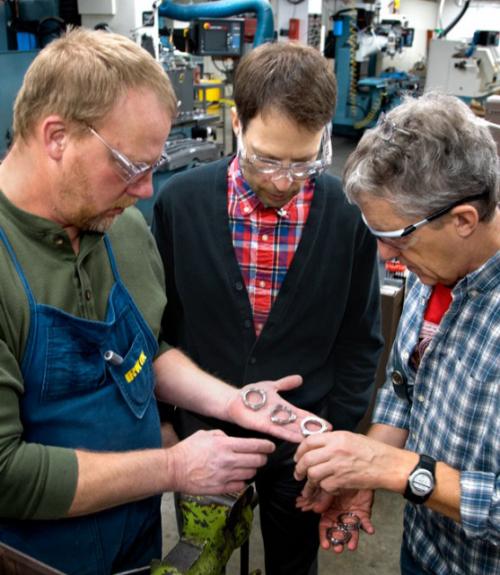Tucked away in the basement of Clark Hall are five staff members whose machining expertise is integral to the success of many of the designs, experiments and innovations of Cornell’s physics faculty, graduate students and postdocs, as well as to work done within other departments and units across campus.
Four of those staff – supervisor Robert Page and equipment technicians Chris Cowulich, Jeffrey Koski and Stanley McFall – work in the Laboratory of Atomic and Solid State Physics (LASSP) Main Machine Shop. The fifth, Nate Ellis, works across the hall, managing the Graduate Research Shop.
“The LASSP/Clark Hall machine shop has a dedicated staff with outstanding expertise in the fabrication of one-off components for diverse research needs,” said Jeevak Parpia, physics professor specializing in experimental condensed-matter physics.
Parpia says his research, and that of his colleagues and students, requires “exquisitely delicate” equipment parts of various tolerances, uses, materials and needs. These often are custom-made items that can’t be ordered from a large-scale retailer.
“Experience with a variety of materials, their properties and characteristics during machining is essential,” Parpia said. “This is where a combination of knowledgeable professional staff and a suite of carefully selected machinery can make a difference in the success or failure of a project.”
Cowulich, Koski and McFall all have worked in the Main Machine Shop for more than 20 years and have a combined 80 years of service to Cornell. Page joined Cornell four months ago, bringing 32 years of machining experience with him.
Work in the Main Machine Shop ranges from simple items, such as door kickplates or drive shafts for ventilation, to highly complex, custom-designed components that might use exotic materials to solve a specific problem or operate under extreme temperatures. The shop provides milling, turning, boring, threading, grinding, engraving, welding, soldering, waterjet cutting and electrical discharge machining, among others, to academics involved in research projects, nonacademic units needing equipment repairs and campus community members with specialty fabricating needs.
“Some days we make parts that are only a few millimeters in size, and other days we make parts that are four feet in length,” Page said. They work with tolerances – the acceptable variation of a stated dimension – that average five-thousandths of an inch. “It is not uncommon for us to occasionally have to hold one ten-thousandth of an inch on some dimensions,” said Page.
Associate professor Carl Franck, who specializes in biological physics and experimental condensed-matter physics, said the machine shop staff are “wizards who share their secrets.”
According to Brad Ramshaw, assistant professor of physics, the machine shop staff will brainstorm with a faculty member or walk a student through the design process. Then, either the pro shop will make the part or the student can choose to make the part using equipment in the Graduate Research Shop, with Ellis’ help.
Faculty and graduate students can use the Graduate Research Shop to operate the shop’s equipment and fabricate their own parts after taking a 25-hour basic machine shop course. The course is taught by Ellis, and emphasizes safety.
“By making a part themselves, our clients get experience on the wide range of operations that can be done, as well as learn what is possible in their design and what modifications might be needed,” Ellis said, noting that this hands-on knowledge also helps clients understand how to buy parts that are manufactured and ordered in bulk.
An extensive stockroom, headed by Robert Sprankle and located nearby, carries many of these bulk items, such as screws and bolts, saving time for faculty and staff who otherwise would need to wait for an order to arrive.
Page hopes to expand the use of the machine shop’s services within the physics department and in other departments across campus. To that end, he would like to modernize some of the shop’s older equipment, as well as buy new.
“The newer machines run faster and are even more precise,” he said. “That would save time and labor costs and allow us to enhance the services we offer.”
If interested in the Machine Shop services, contact Robert Page, email rtp43@cornell.edu, or call 255-3524.
This story also appeared in the Cornell Chronicle.




